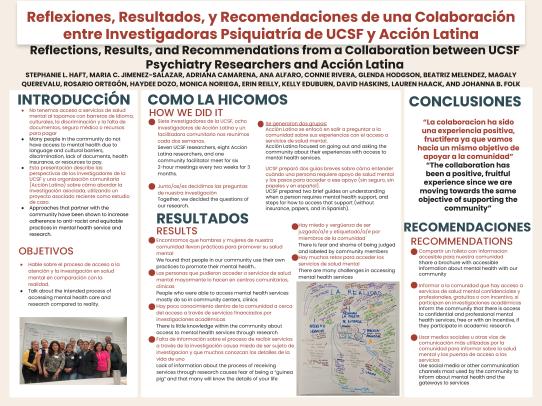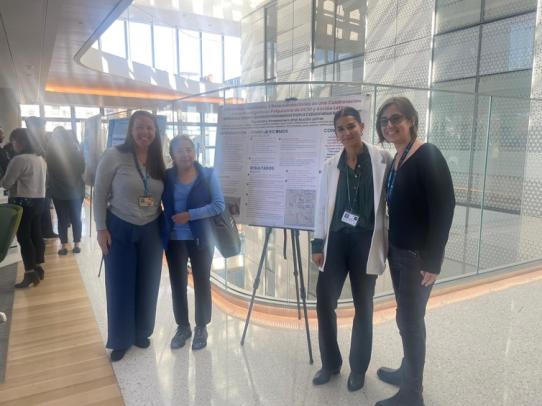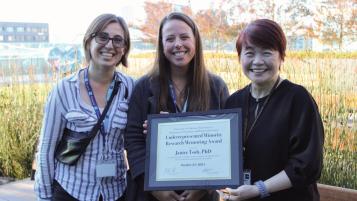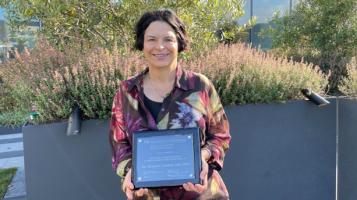
Index
Subcommittee members
Recent Research Efforts
Research Resources
Awards, grants, and programs
The Diversity Committee’s Research Subcommittee aims to:
- Increase and support health equity, antiracist research, and justice, equity, diversity, and inclusion (JEDI)-focused research
- Optimize and respect diversity in our research populations/samples
- Increase diversity among our current and future researchers (including staff, trainees, and faculty)
Subcommittee members
Recent Research Efforts
Current Grants
Our work is funded by a UCSF Resource Allocation Program (RAP) Pilot for Anti-Racism Research Award entitled ““La Comunidad Cura: Exploring Community-Based Remedios for Mitigating Immigration Trauma among Latine Women” (PI: Noriega; Mentors: Folk & Haack; $50,000). Building on our preliminary RAP-funded capacity building project entitled "Community-Based Perspective Taking to Implement Anti-Racist, Inclusive, and Authentic Partnered Research in Psychiatry" (PIs: Folk & Haack; $10,000), this participatory action (PAR) study seeks to explore the impact ofimmigration trauma on Latine women and identify community-based remedios for ameliorating the impact of immigration trauma during the post-migration period. This PAR work occurs in collaboration with Somos Esenciales: a San Francisco Mission-district grassroots community research collective led by immigrant Latine women with a mission to address the mental health crisis within the Latine community using culturally grounded and community-led solutions.
Recent Presentations
Haft, S.L., Jiminez-Salazar, M. C., Camarena, A., Alfaro, A., Rivera, C., Hodgson, Gl., Melendez, B., Querevalu, M., Ortegon, R., Dozo, H., Noriega, M., Reilly, E., Edyburn, K., Hoskins, D., Haack, L., Folk, J. B. (2024, October). Reflections, Results, and Recommendations from a Collaboration between UCSF Psychiatry Researchers and Acción Latina [Poster]. UCSF Health Equity and Antiracism Symposium, San Francisco, CA. Link to poster: https://docs.google.com/presentation/d/1kbz04kg-wvEv59corLavzlU-B6VRk5pqMcbP7V3uj6s/edit?usp=sharing




Research Resources
- For an actively updated library of research resources relevant to diversity, equity, and inclusion, see: https://ucsf.box.com/s/74qb4qaskuqpp2zvera881qze6cjnza8
- To suggest a resource to be added to the library, please fill in the following form:
- https://ucsf.co1.qualtrics.com/jfe/form/SV_aWXRkIeceUvCAUm
Awards, grants, and programs
Underrepresented Minority (URM) Research Mentoring Award
The UCSF Department of Psychiatry and Behavioral Sciences Underrepresented Minority (URM) Research Mentoring Award was established to recognize excellence in research mentorship of departmental trainees who are underrepresented minorities in medicine, including psychiatric and biobehavioral research fields.
- Nominations can include individuals across all ranks!
- The mentoring activities need not have taken place within the context of a primary mentoring role (i.e., informal mentorship roles should be included in the evaluation of the candidate)
- Peer mentorship counts!!!
Nominations are now open!
Previous URM Research Mentoring Award recipients
- 2024 – Janice Tsoh, PhD
- 2023 – Valerie Gruber, PhD
- 2022 – Carmen Masson, PhD
- 2021 – Christina Mangurian, MD, MAS, and Marina Tolou-Shams, PhD
- 2020 – Wendy Berry Mendes, PhD


UCSF PROPEL Program
The UCSF Post-Baccalaureate Research Opportunity to Promote Equity in Learning (PROPEL) Program is a 1- to 2-year paid post-baccalaureate research opportunity serving 10-15 incoming post-bac researchers from groups underrepresented in science through a modest financial incentive for faculty hiring managers, career and professional development training sessions, networking opportunities, and laboratory mentorship. The trainees would have a salary (~41k) and benefits, some supported by NIH supplements in combination with additional incentives ($10-15K) to sponsor the lab work and training of the trainees in their labs.
If you have job openings in your lab, please consider listing them on the PROPEL website.
UCSF grants and other resources
- DPBS funding and resources
- Center for Aging in Diverse Communities Scientist Program
- Office of Diversity and Outreach listing of diversity grants
- Office of Diversity and Outreach listing of health disparities grants
- RAP: SOS for Underrepresented Faculty
- RAP: Family Support Awards
- RAP: Antiracism Pilot Awards
- UCSF Dean’s Diversity Fund
- UCSF-JUSTICE Spark Funding and Bridge Funding Awards
UCSF research centers focusing on women and minority populations
- Center for AIDS Prevention Studies
- Center for Vulnerable Populations
- Center of Excellence for Transgender Health
- Center of Excellence for Women’s Health
- Center for Aging in Diverse Communities
- CTSI Community Engagement Program
- Multiethnic Health Equity Research Center
UC grants and other resources
NIH diversity supplements
Looking to hire a college graduate into a junior specialist or staff resource associate (SRA) position? Consider applying for an NIH diversity supplement to support their research experience if they plan to go on to graduate school.Note: “As of January 29, 2025 the NIH Diversity Supplement FOAs have expired. We will update this page accordingly if/when these are re-issued.”
Per NIH guidelines, under-represented minorities in biomedical research include:
- The following racial and ethnic groups: African Americans, Hispanic Americans, Native Americans, Alaskan Natives, Hawaiian Natives, and natives of the US Pacific Islands.
- Individuals with disabilities, who are defined as those with a physical or mental impairment
- Individuals from disadvantaged backgrounds. (Individuals who come from a family with an annual income below established low-income thresholds.)
More helpful information about NIH diversity supplements is available from CTSI, as well as an overview of the UCSF infrastructure in place to support diversity supplement proposals.
For slides from a recent UCSF DPBS staff/faculty meeting in which our subcommittee presented about diversity supplements, see: https://ucsf.box.com/s/52jt1017pauh5mw1hofcq7ro6rn66cs3
For a list of successful UCSF DPBS applications (and faculty who are willing to be contacted for guidance), see: https://ucsf.box.com/s/9t6ybs2e5lqsyj3izojgq04veet6qu9w
Download slides from this Research Town Hall
National grants for women and minoritized trainees
- APAF Awards for Advancing Minority Mental Health
- APA fellowships
- ACNP travel awards
- BRAIN Initiative Advanced Postdoctoral Career Transition Award to Promote Diversity
- Burroughs Wellcome Fund Postdoctoral Diversity Enrichment Program
- Ford Foundation/National Academies Fellowship Program
- HHMI Hannah H. Gray Fellows Program
- L'Oréal USA Women in Science Program
- National Clinician Scholars Program
- NIH: Enhancing Diversity in Training Programs
- NIH: Ending Structural Racism
- NIMH James Jackson Memorial Award
- NSF Broadening Participation of Groups Underrepresented in Biology
- RWJF Harold Amos Medical Faculty Development Program
- SFARI Supplement to Enhance Equity and Diversity (SEED)
- Vilcek Prizes for Creative Promise in Biomedical Science
- Yale University Wu Tsai Postdoctoral Fellowships



















